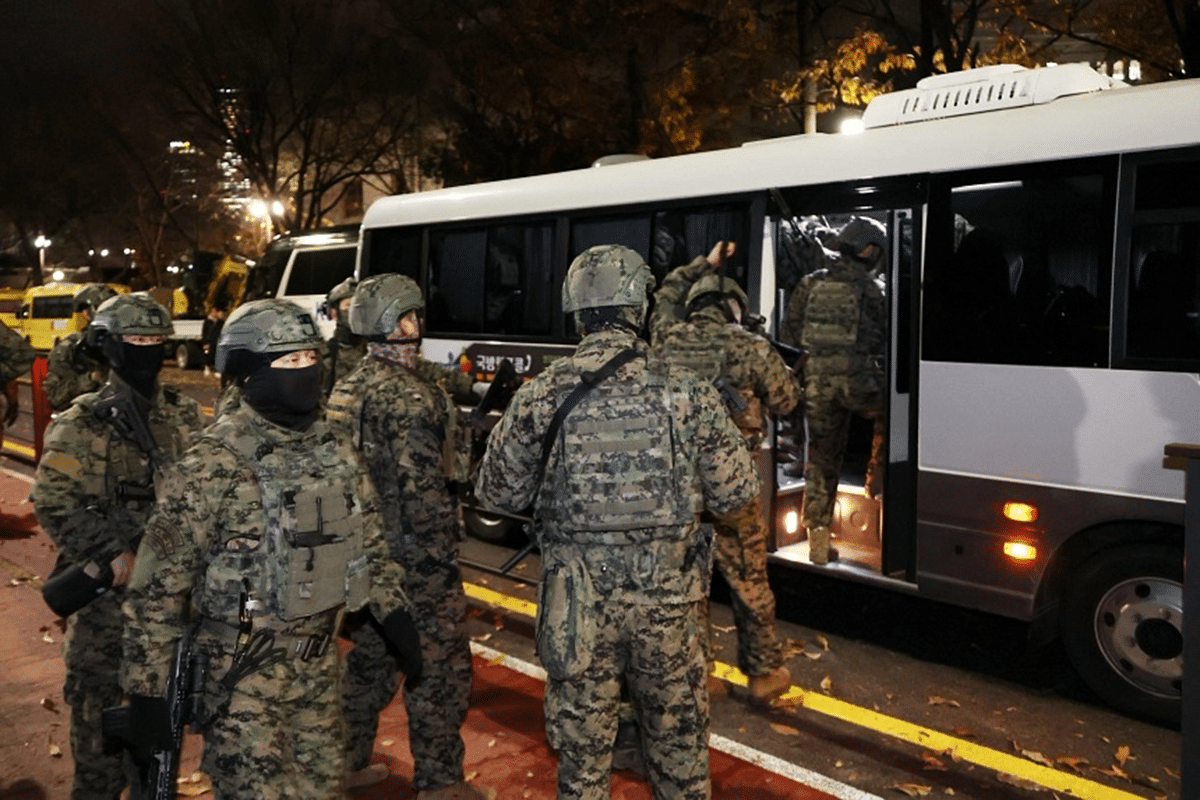


Soldiers leaving the National Assembly after South Korea’s parliament passed a motion requiring the martial law declared by President Yoon Suk Yeol to be lifted, on Dec 4. PHOTO: REUTERS
SEOUL — Hours into the shock declaration of emergency martial law by South Korean President Yoon Suk Yeol, not a single political ally appeared to be left standing with the embattled leader.
Mr Yoon had dropped the bombshell at 10:21 pm on Dec 3, during an apparently unannounced TV address.
Article continues after this advertisementLess than three hours later, all 190 lawmakers who turned up at the National Assembly voted to reject his declaration at an emergency plenary session, while troops blocked entry to the parliament building. Among them, 172 were opposition lawmakers, while 18 were members of the ruling People Power Party.
FEATURED STORIES GLOBALNATION South Korean president declares emergency martial law GLOBALNATION South Korea lifts martial law decree after lawmakers vote against it GLOBALNATION What we know about South Korea's martial lawAll eyes are now on Mr Yoon’s next course of action.
READ: S. Korean opposition parties hint at immediate impeachment of Yoon
Article continues after this advertisement“He only has two options, to resign tomorrow (Dec 4) or wait to be impeached,” said Kyonggi University’s professor of political science and law Hahm Sung-deuk, who decried the martial law declaration as “a terrible thing for South Korea’s democracy”.
Article continues after this advertisementProf Hahm said Mr Yoon has demonstrated a failure to understand “democratic rules, so he will be punished by the people”.
Article continues after this advertisementSpeaking from the presidential office in Seoul, Mr Yoon said that martial law was necessary to protect the nation “from the threats of the North Korean communist forces, and to eradicate the shameless pro-North anti-state forces that plunder the freedom and happiness” of South Koreans.
However, instead of citing any specific threat from the North, he attacked the opposition, describing them as a “hotbed of criminals” seeking to “upend the freedom and democracy” of South Korean people. He stated that he had no choice but to take the drastic measure to safeguard constitutional order.
Article continues after this advertisementREAD: What we know about South Korea’s martial law
Mr Yoon’s move caught both his ruling People Power Party (PPP) and the opposition Democratic Party (DP) off-guard, with PPP Chief Han Dong-hoon condemning the declaration, saying that the party will “block Mr Yoon’s declaration of martial law together with the people.”
Opposition leader Lee Jae-myung rallied his party members to gather at the National Assembly for an emergency plenary session to vote against martial law.
National Assembly speaker Woo Won-shik then declared the martial law invalid, adding that the Assembly will “protect the country’s democracy alongside the people.
Online, most netizens had reacted to the news first with disbelief then with outrage, calling Mr Yoon a dictator and asking for his impeachment.
The last time South Korea came under martial law was in 1980, when then-President Chun Doo-hwan declared martial law on May 17 1980, as student anti-government protests were spreading throughout the country.
Questions are coming fast and furious about the president’s mental fitness in making the shocking move, with Prof Hahm suggesting he “was unstable both physically and emotionally”.
Mr Yoon has been suffering from low approval ratings in recent months, with many of his policies unable to move forward after the opposition won in a landslide during the general elections in April 2024.
Mr Sean King, Asia specialist at New York-based consulting firm Park Strategies, called it a “hugely disappointing move by an apparently desperate” Mr Yoon.
He hailed Mr Yoon’s own party members for vetoing the martial law declaration along with the opposition, calling it “the South Korean democracy showing its durability”.
It will soon become clearer who Mr Yoon truly has behind him.
Troops were seen leaving the National Assembly compound shortly after Mr Woo’s announcement, but large crowds remained outside as protests continued.
If Mr Yoon resigns of his own accord, prime minister Han Duck-soo will lead the government until the presidential elections are held approximately six months later.
Subscribe to our daily newsletter
But if Mr Yoon refuses to resign, the impeachment process will take a “rather long time and come with more severe punishment”, says Prof Hahm, explaining that it will entail a trial by the courtqueen9play, which might impose a severe penalty.
READ NEXT 38 Vietnamese tourists reported missing in South Korea’s Jej... Mondelēz International receives plastic cleanup partner seal EDITORS' PICK What is the 4B movement and what does it mean for Filipinas? The 2024 ICA Art Fair empowered students through art and scholarships Nikola Jokic scores 38 as Nuggets rally past Warriors in NBA Cup Filipina surrogates convicted in Cambodia recruited online – PH embassy Rise of Filipina firewoman Rita Badilla-Gudiño Hannah Kobayashi mystery deepens: LAPD says she crossed US-Mexico border MOST READ China’s PLA Navy shadows Philippine Coast Guard in West Philippine Sea Maris Racal, Anthony Jennings’ 'betrayal' bared by ex-GF Maris Racal, Anthony Jennings’ intimate convos spark online memes Neri Naig ordered released by Pasay court Follow @FMangosingINQ on Twitter --> View comments